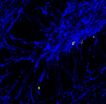(Press-News.org) University of California, Berkeley, researchers have shown that chronic stress generates long-term changes in the brain that may explain why people suffering chronic stress are prone to mental problems such as anxiety and mood disorders later in life.
Their findings could lead to new therapies to reduce the risk of developing mental illness after stressful events.
Doctors know that people with stress-related illnesses, such as post-traumatic stress disorder (PTSD), have abnormalities in the brain, including differences in the amount of gray matter versus white matter. Gray matter consists mostly of cells – neurons, which store and process information, and support cells called glia – while white matter is comprised of axons, which create a network of fibers that interconnect neurons. White matter gets its name from the white, fatty myelin sheath that surrounds the axons and speeds the flow of electrical signals from cell to cell.
How chronic stress creates these long-lasting changes in brain structure is a mystery that researchers are only now beginning to unravel.
In a series of experiments, Daniela Kaufer, UC Berkeley associate professor of integrative biology, and her colleagues, including graduate students Sundari Chetty and Aaron Freidman, discovered that chronic stress generates more myelin-producing cells and fewer neurons than normal. This results in an excess of myelin – and thus, white matter – in some areas of the brain, which disrupts the delicate balance and timing of communication within the brain.
"We studied only one part of the brain, the hippocampus, but our findings could provide insight into how white matter is changing in conditions such as schizophrenia, autism, depression, suicide, ADHD and PTSD," she said.
The hippocampus regulates memory and emotions, and plays a role in various emotional disorders.
Kaufer and her colleagues published their findings in the Feb. 11 issue of the journal Molecular Psychiatry.
Does stress affect brain connectivity?
Kaufer's findings suggest a mechanism that may explain some changes in brain connectivity in people with PTSD, for example. One can imagine, she said, that PTSD patients could develop a stronger connectivity between the hippocampus and the amygdala – the seat of the brain's fight or flight response – and lower than normal connectivity between the hippocampus and prefrontal cortex, which moderates our responses.
"You can imagine that if your amygdala and hippocampus are better connected, that could mean that your fear responses are much quicker, which is something you see in stress survivors," she said. "On the other hand, if your connections are not so good to the prefrontal cortex, your ability to shut down responses is impaired. So, when you are in a stressful situation, the inhibitory pathways from the prefrontal cortex telling you not to get stressed don't work as well as the amygdala shouting to the hippocampus, 'This is terrible!' You have a much bigger response than you should."
She is involved in a study to test this hypothesis in PTSD patients, and continues to study brain changes in rodents subjected to chronic stress or to adverse environments in early life.
Stress tweaks stem cells
Kaufer's lab, which conducts research on the molecular and cellular effects of acute and chronic stress, focused in this study on neural stem cells in the hippocampus of the brains of adult rats. These stem cells were previously thought to mature only into neurons or a type of glial cell called an astrocyte. The researchers found, however, that chronic stress also made stem cells in the hippocampus mature into another type of glial cell called an oligodendrocyte, which produces the myelin that sheaths nerve cells.
The finding, which they demonstrated in rats and cultured rat brain cells, suggests a key role for oligodendrocytes in long-term and perhaps permanent changes in the brain that could set the stage for later mental problems. Oligodendrocytes also help form synapses – sites where one cell talks to another – and help control the growth pathway of axons, which make those synapse connections.
The fact that chronic stress also decreases the number of stem cells that mature into neurons could provide an explanation for how chronic stress also affects learning and memory, she said.
Kaufer is now conducting experiments to determine how stress in infancy affects the brain's white matter, and whether chronic early-life stress decreases resilience later in life. She also is looking at the effects of therapies, ranging from exercise to antidepressant drugs, that reduce the impact of stress and stress hormones.
INFORMATION:
Kaufer's coauthors include Chetty, formerly from UC Berkeley's Helen Wills Neuroscience Institute and now at Harvard University; Friedman and K. Taravosh-Lahn at UC Berkeley's Department of Integrative Biology; additional colleagues from UC Berkeley and others from Stanford University and UC Davis.
New evidence shows how chronic stress predisposes brain to mental disorders
Stress makes neural stem cells mature into more myelin-producing cells, fewer neurons
2014-02-12
ELSE PRESS RELEASES FROM THIS DATE:
Slim pickings for 2 weight-loss drugs?
2014-02-12
LEBANON, NH (Feb. 10, 2014) – Options are limited in America's battle of the bulge. While diet and exercise can help in the short term, they are frustratingly ineffective in the long run.
And, even the search for a magic weight-loss pill is falling short, said Drs. Steven Woloshin and Lisa Schwartz of The Dartmouth Institute for Health Policy & Clinical Practice in the Feb. 10 issue of JAMA Internal Medicine.
Many medications for weight loss have been proposed or are under development. The Federal Drug Administration has approved few drugs for long-term weight loss, ...
UTMB study examines hospital readmission rates after inpatient rehabilitation
2014-02-12
Nearly 12 percent of Medicare patients who receive inpatient rehabilitation following discharge from acute-care hospitalization are readmitted to the hospital within 30 days after discharge from the rehabilitation facility according to new research published in the Feb. 12 issue of the Journal of the American Medical Association. Before now, there was a lack of research on the frequency and causes of patients returning to hospital after rehabilitation.
The new research reports 30-day hospital readmission rates across rehabilitation impairment categories and examines ...
New UK study shows potential for targeting aggressive breast cancers
2014-02-12
LEXINGTON, Ky. (Feb. 10, 2014) — A new study led by University of Kentucky Markey Cancer Center researcher Peter Zhou shows that targeting Twist, a nuclear protein that is an accelerant of the epithelial-mesenchymal transition (EMT) program in human cells, may provide an effective approach for treating triple-negative breast cancer.
Triple-negative breast cancer has an activated EMT program, which is a process that provides cells with the increased plasticity (or flexibility) to adapt to stressed environments during embryonic development, wound healing, tissue fibrosis ...
Penn Medicine: Cognitive development 'growth charts' may help diagnose and treat psychosis-risk kids
2014-02-12
PHILADELPHIA -- Penn Medicine researchers have developed a better way to assess and diagnose psychosis in young children. By "growth charting" cognitive development alongside the presentation of psychotic symptoms, they have demonstrated that the most significant lags in cognitive development correlate with the most severe cases of psychosis. Their findings are published online this month in JAMA Psychiatry.
"We know that disorders such as schizophrenia come with a functional decline as well as a concurrent cognitive decline," says Ruben Gur, PhD, director of the Brain ...
UNC study reveals potential route to bladder cancer diagnostics, treatments
2014-02-12
CHAPEL HILL, NC – Researchers at the UNC School of Medicine conducted a comprehensive genetic analysis of invasive bladder cancer tumors to discover that the disease shares genetic similarities with two forms of breast cancer. The finding is significant because a greater understanding of the genetic basis of cancers, such as breast cancers, has in the recent past led to the development of new therapies and diagnostic aids.
Bladder cancer, which is the fourth most common malignancy in men and ninth in women in the United States, claimed more than 15,000 lives last year.
The ...
Change in guidelines for Type 2 diabetes screening may lead to under-diagnosis in children
2014-02-12
Ann Arbor, Mich. – New American Diabetes Association (ADA) screening guidelines may lead to the missed diagnoses of type 2 diabetes in children, according to a new study by University of Michigan.
The research, published in the Journal of Adolescent Health, finds that both pediatric and family medicine providers who care for children are using screening tests for type 2 diabetes that may result in missed diagnoses for children, says lead author Joyce Lee, M.D., M.P.H., associate professor in U-M's Departments of Pediatrics and Communicable Diseases and Environmental ...
New imaging technique can diagnose common heart condition
2014-02-12
CHICAGO --- A new imaging technique for measuring blood flow in the heart and vessels can diagnose a common congenital heart abnormality, bicuspid aortic valve, and may lead to better prediction of complications.
A Northwestern Medicine team reported the finding in the journal Circulation. In the study, the authors demonstrated for the first time a previously unknown relationship between heart valve abnormalities, blood flow changes in the heart and aortic disease. They showed that blood flow changes were driven by specific types of abnormal aortic valves, and they were ...
Four new galaxy clusters take researchers further back in time
2014-02-12
Four unknown galaxy clusters each potentially containing thousands of individual galaxies have been discovered some 10 billion light years from Earth.
An international team of astronomers, led by Imperial College London, used a new way of combining data from the two European Space Agency satellites, Planck and Herschel, to identify more distant galaxy clusters than has previously been possible. The researchers believe up to 2000 further clusters could be identified using this technique, helping to build a more detailed timeline of how clusters are formed.
Galaxy clusters ...
Thatcher's policies condemned for causing 'unjust premature death'
2014-02-12
Dr Alex Scott-Samuel and colleagues from the Universities of Durham, West of Scotland, Glasgow and Edinburgh, sourced data from over 70 existing research papers, which concludes that as a result of unnecessary unemployment, welfare cuts and damaging housing policies, the former prime minister's legacy "includes the unnecessary and unjust premature death of many British citizens, together with a substantial and continuing burden of suffering and loss of well-being."
Speaking about the figures, Dr Scott-Samuel said: "Towards the end of the 1980s we were seeing around 500 ...
Better RNA interference, inspired by nature
2014-02-11
CAMBRIDGE, MA -- Inspired by tiny particles that carry cholesterol through the body, MIT chemical engineers have designed nanoparticles that can deliver snippets of genetic material that turn off disease-causing genes.
This approach, known as RNA interference (RNAi), holds great promise for treating cancer and other diseases. However, delivering enough RNA to treat the diseased tissue, while avoiding side effects in the rest of the body, has proven difficult.
The new MIT particles, which encase short strands of RNA within a sphere of fatty molecules and proteins, silence ...
LAST 30 PRESS RELEASES:
The Lundquist Institute receives $2.6 million grant from U.S. Army Medical Research Acquisition Activity to develop wearable biosensors
Understanding the cellular mechanisms of obesity-induced inflammation and metabolic dysfunction
Study highlights increased risk of second cancers among breast cancer survivors
International DNA Day launch for Hong Kong’s Moonshot for Biology
New scientific resources map food components to improve human and environmental health
Mass General Brigham research identifies pitfalls and opportunities for generative artificial intelligence in patient messaging systems
Opioids during pregnancy not linked to substantially increased risk of psychiatric disorders in children
Universities and schools urged to ban alcohol industry-backed health advice
From Uber ratings to credit scores: What’s lost in a society that counts and sorts everything?
Political ‘color’ affects pollution control spending in the US
Managing meandering waterways in a changing world
Expert sounds alarm as mosquito-borne diseases becoming a global phenomenon in a warmer more populated world
Climate change is multiplying the threat caused by antimicrobial resistance
UK/German study - COVID-19 vaccine effectiveness and fewer common side-effects most important factors in whether adults choose to get vaccinated
New ultraviolet light air disinfection technology could help protect against healthcare infections and even the next pandemic
Major genetic meta-analysis reveals how antibiotic resistance in babies varies according to mode of birth, prematurity, and where they live
Q&A: How TikTok’s ‘black box’ algorithm and design shape user behavior
American Academy of Arts and Sciences elects three NYU faculty as 2024 fellows
A closed-loop drug-delivery system could improve chemotherapy
MIT scientists tune the entanglement structure in an array of qubits
Geologists discover rocks with the oldest evidence yet of Earth’s magnetic field
It’s easier now to treat opioid addiction with medication -- but use has changed little
Researchers publish final results of key clinical trial for gene therapy for sickle cell disease
Identifying proteins causally related to COVID-19, healthspan and lifespan
New study reveals how AI can enhance flexibility, efficiency for customer service centers
UT School of Natural Resources team receives grant to remove ‘forever chemicals’ from water
Sweet potato quality analysis is enhanced with hyperspectral imaging and AI
Use of acid reflux drugs linked to higher risk of migraine
For immigrants to Canada, risk of MS increases with proportion of life spent there
Targeted use of enfortumab vedotin for the treatment of advanced urothelial carcinoma
[Press-News.org] New evidence shows how chronic stress predisposes brain to mental disordersStress makes neural stem cells mature into more myelin-producing cells, fewer neurons


